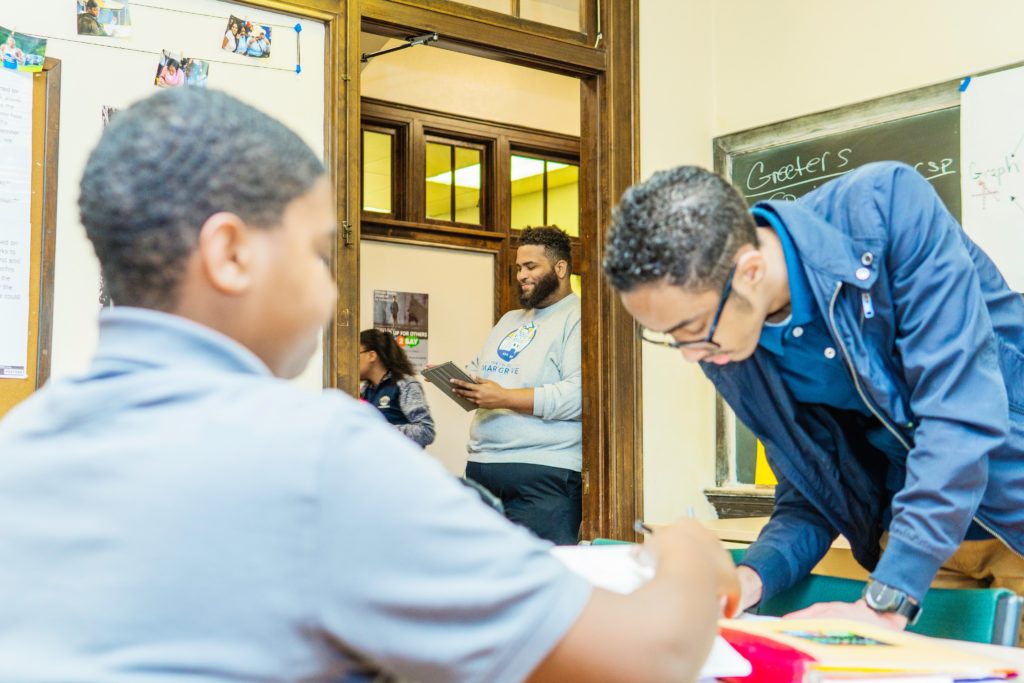Developing Teachers and Leaders with an Equity Focus with Teach for America Detroit
Every single day teachers are showing up with incredible courage and skill. But they’re running into a headwind because the conditions, policies, and systemic-level practices are blowing in their faces. Teach for America and DCF are working to change that.
Armen Hratchian
Executive Director, Teach for America
In communities across America, Teach for America (TFA) is helping expand educational access and opportunity for children. TFA Corps members commit to teaching for two years in a low-income community, where they’re employed by local schools and confront both the challenges and joys of making educational equity a reality. Once they complete their commitment, Corps members join an extensive network of TFA alumni fellows, many of whom rise in leadership and work together to create systemic change in their educational communities.
The TFA Detroit chapter works hand-in-hand with the community, making Detroit a place where schools are pillars of educational excellence. Currently it supports 100 teachers who are serving more than 7,000 students in the city, as well as 200 TFA Detroit alumni. In its beginnings in 2010, TFA Detroit was one of the fastest-growing chapters in the country. However, as a result of legislative changes in Detroit’s educational landscape, the chapter began to shrink significantly. In 2018, with a leading grant from Detroit Children’s Fund, it began its ambitious rebuild to again provide teachers and leaders to Detroit’s schools at scale. TFA Detroit’s goal is to create a more diverse, committed and effective network of leaders who will impact Detroit for the long-term.

Empowering diverse educators in high-need areas
“We have a commitment to recruiting strong educators, in particular, people of color,” says Marah Casey, Director, Institutional Advancement at TFA. “Given that Detroit schools are more than 85 percent Black students, it’s really important that they have educators that reflect their identity and come from similar backgrounds, having the mirror that can help change their trajectory.”
Keavin Smith is one such teacher. At first, the idea of being an educator was not on Keavin’s career radar. He was studying global business and Spanish at University of Rhode Island and had dreams to go into business. In his junior year, he had built a close relationship with a professor and TFA alumni who saw something in him. “There’s something special about the way you relate to people,” Keavin’s professor told him. “You should look at Teach for America.”
When Keavin browsed the TFA website, its mission statement caught his eye, which focuses on teaching in high-need areas primarily to students of color. This really hit home for Keavin, a bi-racial male, who grew up in a single-parent household as one of four children. He saw that his experience could make a difference to others just like him. Soon, he found himself packing his bags and heading to Detroit’s Brenda Scott Academy.
When he arrived, Keavin discovered a home in his second-grade classroom. However, his experience was not without significant challenges. His students were behind academically, with many not knowing how to write or read. Keavin reached out to fellow TFA Corps members to discuss teaching strategies.
“Building academic confidence is a major key in helping these children develop,” says Keavin. “A lot of my training with Teach for America isn’t just academics. It’s about teaching emotional learning and fostering a classroom that is inclusive to all.”
For Keavin, this means daily check-in with students, creating a safe space where students can be themselves, connecting with parents to see how they are doing. This 360-degree approach to education is critical in environments where students need extra support.
TFA Detroit is committed to helping teachers like Keavin continue to grow their skills. Funding from DCF helped TFA Detroit implement the Detroit Summer Learning Institute, a summer school that gives first- and second-year, and alumni teachers an opportunity to learn alongside each other and support students in real-time. This past year, the initiative served 1,000 students in the summer.
It’s programs like these that have helped to transform TFA-Detroit into an up-and-coming region. “We’ve gone from having 40 educators to over 100 educators,” says Armen Hratchian. “We’ve gone from retaining 50 percent of teachers to 85 percent of our teachers. All those things would not have been possible with DCF’s investment in us.”
Like many in the TFA program, Keavin plans to stay in education long after he completes his two-year commitment with TFA. Nearly 80 percent of individuals who first applied to TFA Detroit had no intention of being in education and over 85 percent stay working in education or serving low-income communities.
For Keavin, the rewards have already gone beyond what he anticipated: “What I’m doing matters. Children need to have teachers who grew up in the same kind of neighborhood with the same background as them. They need to see what they can be one day.”
Principal Willie Brewster, who leads the Brenda Scott Academy and recruits TFA teachers like Keavin couldn’t agree more: “Black and Brown kids deserve to have an education that reflects them; that is tailored for them; that celebrates them. Education is the way we present a revolutionary act in getting Black and Brown kids what they deserve.”

Harnessing the power of an extensive alumni network
Currently there are 800 TFA alumni across the state of Michigan, many of whom are rising in their leadership across all sorts of industries — from representatives in the State House of Representatives to leaders in major nonprofits and rising master teachers across the Detroit landscape.
“When you see the incredible potential for major collective influence, in particular on system change, it’s invigorating,” says Marah Casey. TFA Detroit is working to maximize impact, connect alumni and build a community of educators who are working together across the city. Its most recent initiatives include fellowships designed to develop alumni educators who are proven high-performers in the city.
Melanie Wiggins is one such leader, and part of TFA’s first alumni fellowship cohort of 15 educators. She comes from a long legacy of female educators in her family. When Wiggins was a little girl she remembers asking for a white board and projector for Christmas. “I was preparing myself for my career very early on,” she says, “It’s in my blood.”
In 2013, Wiggins moved from Georgia to Michigan as a TFA Corps member and now teaches at the Brenda Scott Academy. “Before I started my career, I had a vague idea that the educational outcomes for low income Black and Brown students were not the same as they were for their white, wealthy counterparts,” she says. “Now, I see it up close and personal – from the inequities in funding to teacher turnover and the lack of resources and support for educators.”
Being a part of the TFA alumni fellowship has helped Wiggins hone her personal practice. She has learned about anti-bias education, culturally responsive teaching and how to advocate within her school for more equitable practices. “In terms of the evolution of my role as an educator, this is helping me zoom out and advocate for my students outside of the classroom, whether that’s to my principal to help inform district policies or being involved in movements in the city,” she says.
Wiggins is also the co-chair of a TFA alumni board called The Collective, which brings together TFA leaders who are native indigenous and people of color. The group’s goal is to mobilize alumni and Corps members to create more equitable systems and structures within the city of Detroit.
“The phrase ‘It takes a village’ is really key,” she says. “I want every student in Detroit to feel like they are part of a village — of adults, community support, and resources — that are there to help encourage them to thrive, to follow their passions, to be true to themselves. There’s a lot of debate in the education community about, What is the purpose of schools? I’m of the belief that our schools should cultivate students to be their authentic selves.”

Connecting leaders, changing systems
Zooming into a TFA Detroit Board meeting, it’s easy to see how the organization threads together leaders across segments to create change. In the most recent gathering, three speakers — an alumni teacher, a principal and a school leader at a charter school — presented their hopes, challenges, and their vision for a way forward for their students and schools.
“Each of them very much represents future leaders in key systems that have likely a long battle ahead,” says Armed Hratchian. “The three of them have grown to know each other and are learning together across these systems on how to lead together.”
This is the crux of what excites TFA Detroit and DCF for the future. While still deeply focused on recruiting and supporting teachers, TFA Detroit is committed to changing the systemic conditions around Detroit’s education system that have long been oppressive.“We’ve made significant progress. We, the collective we,” says Hratchian. “There’s greater stability at the governance level of the district, at the city level and in the nonprofit sector. There’s an orientation toward greater investment in education, both statewide and from the business community. All of those things are starting to create a tailwind for our educators. Imagine if we could deliver that every day. I know that DCF shares our vision of excellence for all children in Detroit.”
